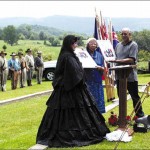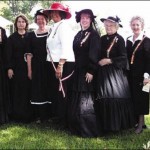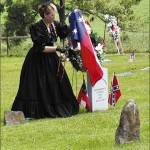In my last post on “black Confederates” I wondered whether the two women dressed in mourning attire were white. Well, I have no doubt that the women in these images are indeed white. And…yes, they are decorating the grave of “Pvt. Henry Henderson, a black Confederate soldier.” This article is so poorly reported that it is impossible to know for sure the status of Henderson without going to the archives. That said, I have an idea. According to the article:
Henderson was born in 1849 in Davidson County, NC. He was 11 years old when he entered service with the Confederate States of America as a cook and servant to Colonel William F. Henderson, a medical doctor. Records show Henry was wounded during his service, but he continued to serve until the war’s end in 1865. He was discharged in Salem, NC, age 16.
As Peter Carmichael notes in his essay, Confederate officers often brought their slaves with them as camp servants as a reflection of their social status and for their services. And many were even outfitted with uniforms. After noting that 60-90,000 “black Confederates served” in the Confederate army the author notes that Henderson’s sons received their father’s one and only pension check from the state of Tennessee in 1926. Of course, as many of you know the receipt of a pension check does not tell us much of anything about the status of black men in the Confederate army. [Consider the case of Weary Clyburn and see a recent post by Robert Moore, here]
Like the Sons of Confederate Veterans, the United Daughters of the Confederacy teach us nothing about the complex history of race relations in the Confederacy. Henry Henderson deserves to have his story told as well as have his life recognized and honored by his descendants. Based on the skimpy evidence provided in this article we should conclude that Henderson was a slave who happened to find himself with the army as a young boy. That this boy was forced to join his master in the army at such a young age, and was eventually wounded, must be understood as an extension of a broader life story of coercion. I often wonder what Henderson himself would say about such a spectacle.
The women in these images are not honoring a soldier, they are honoring a slave.



I just happened on this article while doing some research on my Grandmother’s Grandfather, Henry Henderson. I am just learning about all the false history of the civil war that most of us have been indoctrinated with. I never understood what the really story was until now. I would love to hear from the author of this article. I am a descendent of Henry Henderson and it is difficult to find out anything concreate about him. I do know that he was not a slave. We are the original people of this land and it seems that we are still prisoners of war.
Well, it’s very clear by comparing the blog pictures and the text that the author is simply hell-bent on disparaging the UDC and SCV, and nothing else. There are two women and a man in the foreground of that photo, and though he states both women are clearly white, one is unmistakably a black woman, and there is a black man, most likely descendants of the honoree. The UDC and the SCV do not conduct these memorial services to honor slaves or slavery. They are conducted to honor the persons that fought or participated in any way in the War Between the States for the Confederacy. Whether or not a person was willingly enlisted or drafted into any war is of no consequence to the fact that they served, they fulfilled their duty, and they deserve to be remembered, honored and appreciated for their contributions and service, and their descendants have the right to honor and recognize them and to have them honored and recognized by others. Your ancestor could have been an actual soldier, a cook, a laundress, a groomsman, or a bugler or drummer. If they served honorably in any capacity, they are honored and respected for their service, regardless of any other factor. You do not have to join or be a member of either organization to have your ancestor honored and recognized for their service. The UDC and the SCV honor all military veterans of all wars. Both organizations present honors, recognitions, certificates and medals to veterans of other wars in appreciation of their service to the United States. The only requirement is that they have served honorably and be a descendant of a Confederate Veteran, they do not have to be a member of either group.
Both organizations do have Black members, and all that is required for membership is to show that you are descended from a Confederate Ancestor of the War Between the States. Nowhere on any application are you ever asked to note race or skin color. Neither organization honors or condones the institution of slavery, it is simply recognized as a part of the history of that time and era.
Suggested Reading: Virginia’s Black Confederates, Essays and Rosters, by Greg Eanes, ISBN9781481986533.
No, just “hell-bent” on pointing out bad history. Thanks for reminding me.
Two of the persons in the foreground of the color photograph are clearly African Americans; look at their facial features and their skin color. Why did you not print their names from the caption so we could contact them and see what they have to say about their participation in the service and get their opinions, which may be a little more detailed and accurate than your own?
Kevin… please adjust the reference to my post. That should read “Robert” not “Richard” Moore. Thanks.
Sorry about that.
Lee,
Thanks for taking the time to do a little research. I can’t say I’m surprised by your lack of findings as most of these examples involved dubious research methods or no research at all. Perhaps his name will turn up, though that would constitute just the beginning of a detailed research project to uncover Henry Henderson’s story.
This is interesting, I have looked up Henry’s pension and it states that no regiment was given, and I have just checked Bruce Allardice’s Confederate Colonels, Clark’s North Carolina Regiments, A Biographical Roster of Davidson County Confederates, Crute’s Units of the Confederate States Army, as well a thorough search of the internet and cant find Colonel William F. Henderson, Ive come across several privates, but no high ranking officer or surgeon. So, Im really wondering about this now.
Yes, that is a more accurate description, Kevin, but it seems that it is a good start to me. Thank you as well.
This comparison won’t hold for many reasons, and it is not historical analysis, but it may provide another view. If black men who were slaves who were forced to be camp servants in the Confederate army, were further forced to bear arms and fight the Union army, their experiences as soldiers, whether the Confederate officers and regular soldiers validated that experience or not, gave those men fleeting moments of autonomy, and they may have found themselves working against themselves, much like the British soldiers in the film “The Bridge over the River Kwai”. I understand the complications with the comparison, starting with the fact that the film does not accurately portray a Japanese prisoner of war camp. Also, the British were soldiers and the black men who were slaves forced into the Confederate army remained slaves. In addition, the comparison will be denounced from both sides. Yet, it is still conceivable that a black man who was a slave and who was forced to fight acted bravely and died fighting the very men who were coming to free him, not because he wanted to remain a slave, but because he had become a soldier for those moments and hours when he was in battle, and that is a possible part of the narrative of the American Civil War that is not being told (to my knowledge) because we are locked in a battle over memory that centers around the tenacious hold the Lost Cause myth has on our memory, and a battle for memory that is necessary. I don’t quite understand what I am trying to say myself, Kevin, so I will cease and desist. I will leave this to historians. Thank you. Sherree
Sherree,
Well, I don’t think I’ve told Henderson’s story. I would like to think that taken together these posts help to put us in a position where we can begin to take their stories seriously. Thanks.
I knew you agreed with Marc, Kevin. And you did make your point. And you made it well. When modern men and women exploit the memory of an eleven year old child born into slavery who was forced to be a camp servant in a bloody war, there is nothing more to be said about what is wrong with this type of ceremony. It is disgraceful. And no argument about whether there were “black Confederates” or not, or if there were “black Confederates”, how many? can make it otherwise. In fact, all arguments are moot. You have honored Henry Henderson here today on this blog by telling his true story. I hope that serious research into this subject is conducted so that all of the Henry Hendersons of the Civil War are remembered in a way that is worthy of who they actually were, and of how they actually lived their lives.
I also agree with Marc, which is exactly what I was trying to point out in the post. The women pictured here are completely incapable of commemorating Henderson’s life because they fail to acknowledge him for what he was – a slave. It is even worse given that the individual in question was a young boy, which only works to compound the tragedy of the story and the extent of the exploitation.
No, these women honored him for being a brave person who served in a war. Doesn’t matter what his station in life was, he honorably served, and deserved to be recognized for that service. I fail to see how showing someone honor and respect is exploitation of anything, especially something that no longer exists.
These men served as slaves, yet that rarely, if ever, is mentioned. They didn’t serve the Confederacy. They served their masters who were fighting for the right to continue to own these men.
Why not honor the 4,000,000 who were enslaved at the time of the war and the many enslaved before it?
why pick out this one person to ‘honor’?
Where are the markers and ceremonies respecting the ‘service’ of all the enslaved?
Hank they tried that too. Went about as well as you would expect:
https://pastexplore.wordpress.com/2015/10/01/louisianas-uncle-jack-statue-and-the-problem-of-interpreting-iconography-in-history-museums/
yep.
white people memorializing slaves on the white’s terms (‘faithful’, et al) is a bit incongruous.
“Pvt. Henry Henderson, a black Confederate soldier.”
If you have to lie about it, you really don’t have much of a case. Or honor. Or respect.
I could really care less about what these women are doing…it’s their dresses that scare me :0) I’ll stick with jeans and a t-shirt, thank you.
“The women in these images are not honoring a soldier, they are honoring a slave. ”
“Kevin,
I would say that these women are not actually honoring a slave, but continuing to exploit that slave a century and a half after then end of slavery.”
Marc has it right. Eleven? So not only were adult black men who were slaves forced to be camp servants; children were forced to be camp servants, too. That puts it all in perspective.
Marc has it right.
Kevin,
I would say that these women are not actually honoring a slave, but continuing to exploit that slave a century and a half after then end of slavery.
Marc